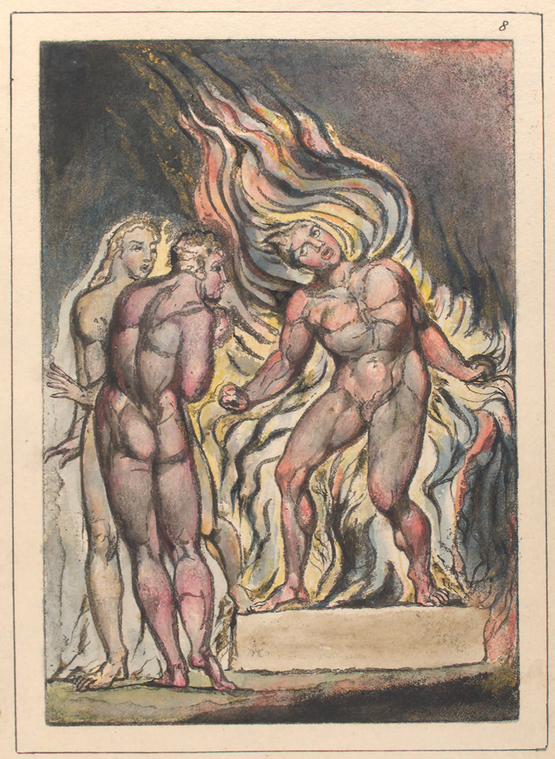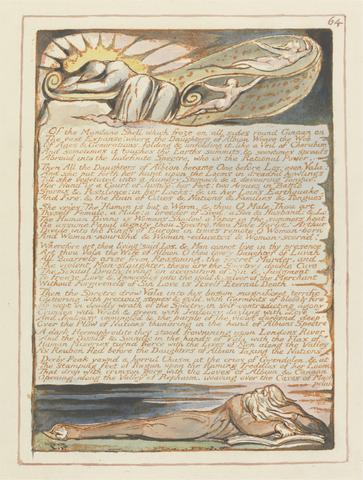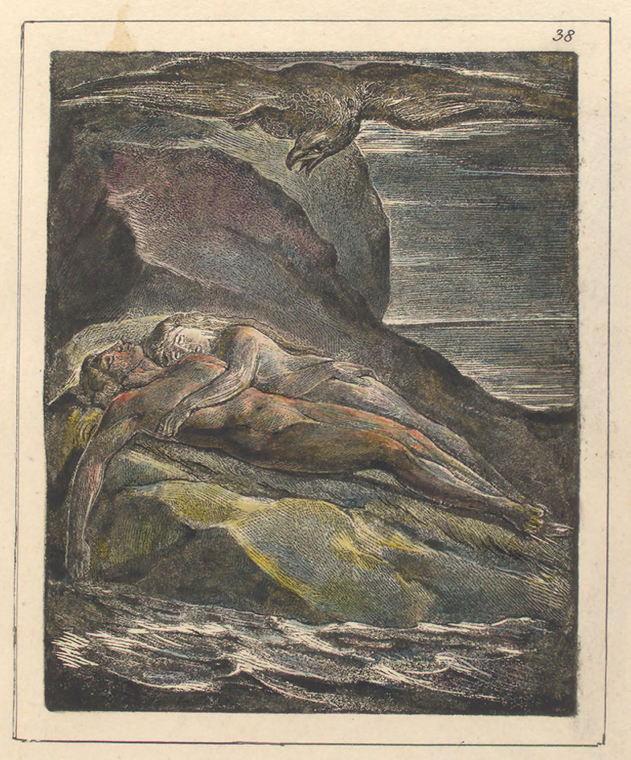 |
Yale Center for British Art
Jerusalem
Plate 37, Detail
|
Rest is an opportunity for replenishment and renewal. For Blake rest is active engagement of the Imagination in the arts and sciences which rejuvenate the spirit.
When Blake used the phrase 'Rest before Labor' at the beginning of the Four Zoas he thought of the preparation which preceded his first attempt to write an epic poem. He thought of the effort which would go into the composition on such a large theme. He thought of the challenge which his readers would face in digesting such a quantity of ideas. He thought of the rewards for himself and his reader for engaging in the mental battles required. And if the writing and reading were the labor required, they would introduce another period of productive rest when ideas would germinate before the labors continued.
On Plate 37 of Jerusalem Albion's emanation Jerusalem sleeps in perfect rest as the struggle around her is not against flesh and blood, but against principalities, against powers, against the rulers of the darkness of this world, against spiritual wickedness in high places. (Ephesians 6:12)
Four Zoas, Night I, Page 1, (E 300)
" THE FOUR ZOAS The torments of Love & Jealousy in The Death and Judgement of Albion the Ancient Man by William Blake 1797 PAGE 2 Rest before Labour PAGE 3 <4 12="" 6:="" ephesians="" greek="" lines="" of="" text=""> <[For we wrestle not against flesh and blood, but against principalities, against powers, against the rulers of the darkness of this world, against spiritual wickedness in high places. (King James version)]>"
Four Zoas, Night I, Page 21 [19], (312)
"The Family Divine drew up the Universal tent
Above High Snowdon & closd the Messengers in clouds around
Till the time of the End. Then they Elected Seven. called the Seven
Eyes of God & the Seven lamps of the Almighty
The Seven are one within the other the Seventh is named Jesus
The Lamb of God blessed for ever & he followd the Man
Who wanderd in mount Ephraim seeking a Sepulcher
His inward eyes closing from the Divine vision & all
His children wandering outside from his bosom fleeing away t
PAGE 22 [20]
The Daughters of Beulah beheld the Emanation they pitied
They wept before the Inner gates of Enitharmons bosom
And of her fine wrought brain & of her bowels within her loins
Three gates within Glorious & bright open into Beulah
From Enitharmons inward parts but the bright female terror
Refusd to open the bright gates she closd and barrd them fast
Lest Los should enter into Beulah thro her beautiful gates
The Emanation stood before the Gates of Enitharmon
Weeping. the Daughters of Beulah silent in the Porches
Spread her a couch unknown to Enitharmon here reposd
Jerusalem in slumbers soft lulld into silent rest
Terrific ragd the Eternal Wheels of intellect terrific ragd
The living creatures of the wheels in the Wars of Eternal life
But perverse rolld the wheels of Urizen & Luvah back reversd
Downwards & outwards consuming in the wars of Eternal Death
PAGE 21 [19]
End of The First Night"
Genesis 2[1] Thus the heavens and the earth were finished, and all the host of them.
[2] And on the seventh day God ended his work which he had made; and he rested on the seventh day from all his work which he had made.
[3] And God blessed the seventh day, and sanctified it: because that in it he had rested from all his work which God created and made.
Hebrews 4
[8] For if Jesus had given them rest, then would he not afterward have spoken of another day.
[9] There remaineth therefore a rest to the people of God.
[10] For he that is entered into his rest, he also hath ceased from his own works, as God did from his.
[11] Let us labour therefore to enter into that rest, lest any man fall after the same example of unbelief.
[12] For the word of God is quick, and powerful, and sharper than any twoedged sword, piercing even to the dividing asunder of soul and spirit, and of the joints and marrow, and is a discerner of the thoughts and intents of the heart.
[13] Neither is there any creature that is not manifest in his sight: but all things are naked and opened unto the eyes of him with whom we have to do.
[14] Seeing then that we have a great high priest, that is passed into the heavens, Jesus the Son of God, let us hold fast our profession.
[15] For we have not an high priest which cannot be touched with the feeling of our infirmities; but was in all points tempted like as we are, yet without sin.
[16] Let us therefore come boldly unto the throne of grace, that we may obtain mercy, and find grace to help in time of need.



_object_49_A_Poison_Tree.jpg)



